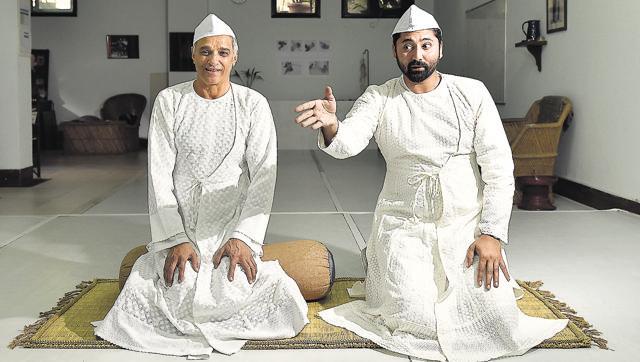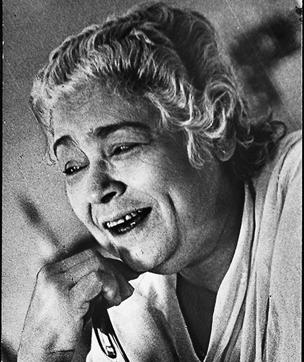Ismat Chughtai’s inimitable take on marriage and sexual liberation
Lajjo, the protagonist of Ismat Chughtai’s short story, Gharwali (The Home-Maker), is a woman of precise pleasures. Of illegitimate birth and with little money, she has the survival skills of an alley cat. If she is fed, she will bed.

Having grown up on the streets, she, however, doesn’t think much of social status and hierarchy. She does not distinguish between the neighbourhood milkman and the rich merchant or the boy next door – Lajjo’s smiles are for all. Her relationships are open-ended. In the hour of love, she holds back nothing from the man with a big purse or from the man with none.
Former journalist-turned-actor Sunil Mehra and human rights lawyer Askari Naqvi, who are presenting a dastangoi session with Gharwali, talk about why they chose this Chughtai text. “The possibility of love without social contract and the right to live by values that fly in the face of conventional wisdom spoke to us,” says Mehra during a dress rehearsal at his basement studio. “A lot of us were chafed about the rise of the Right and orthodoxy in India and worldwide. We were looking for ways to protest this. And what better way to do this than through storytelling, through metaphor and allegory – all of which is possible through dastangoi.”
Around 10 years ago, leading Urdu poet-critic-novelist Shamsur Rahman Faruqi re-introduced Delhi to this 16th-century Urdu oral storytelling art form. His nephew Mahmood Farooqui and Farooqui’s stage partner Danish Husain brought a host of stories and narratives laced with satire and socio-political content to audiences. Mehra, who had done supper theatre, anchored radio plays, done TV, acted in commercial Hindi films (he is playing Anushka Sharma’s dad in an upcoming film), picked up the manner and the essence of dastangoi by watching Farouqui and Husain’s performances.
The language and the culture of Urdu he already knew courtesy his upbringing. His mother is from Multan; his father from Lucknow. Askari is a Lucknow boy too. He is also an accomplished artist of sozkhwani, a dramatic recital of the battle of Karbala performed during Muharram.
“Dastangoi is a theatre of language, there’s no acting involved. Askari and I had the same understanding and feel for the language, and the same political views,” says Mehra, explaining the partnership.
This is Askari’s first dastangoi performance. Mehra did his first dastangoi a year ago; Gharwali is his sixth performance and his first Chughtai. Both were understandably drawn to Chughtai for the same reasons. “In Chughtai, the language is the character. No word is superfluous. Hum ki jagah tum bolna means something. Every line or phrase has meaning and significance,” says Askari. The two dastangos also chose the Chughtai text for its progressive content.

“Lajjo,” says Mehra “is the effortless feminist, an independent woman, a free radical, subversive, a survivor, a force of nature….” These series of adjectives have so often been strung around the ‘modern woman’, and interchangeably used for ‘the sexually liberated woman’, in books and films, that one wonders if this is a hook any more. The key to Chughtai’s feminism, explains Mehra, is that it is not gendered. “So that’s a common legacy for men and women. It is not so much about equality of the two sexes as it is about solidarity.”
Lajjo certainly is desired by all. But she falls in love with Mirza, the elderly bachelor and neighbourhood grocer in whose house she is the live-in maid. In a strange sort of way, his loneliness, his diffidence, and even his proposal of marriage appeals to her – though she does not understand it and finds it unnecessary.
“Mirza never treats her like dirt,” says Mehra. “Lajjo’s former masters, once they became her lovers, took it for granted that she was not to be paid for sexual favours. They even farmed her out to other men. Mirza alone considers her his own. He considers her worth keeping.”
Through the questioning of the institution of marriage by the principal character, Chughtai delivers a strong message about how fidelity is possible without marriage. Both Lajjo and Mirza are, in fact, happier after talaaq. Will this raise some eyebrows in these times of heated discussions on triple talaaq? Surely not. But we mustn’t say more. Catch the performance to know how L & M resolve the issue. We wouldn’t want to give the game away.
What: Gharwali by Ismat Chughtai, an evening of dastangoi
When: November 27, 6:30-8pm
Where: vis a vis Experience Centre, 2 North Drive, DLF Chattarpur Farms. For details call 9953479378. Nearest metro station: Chattarpur.





